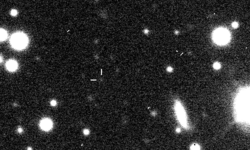Chaldene facts for kids

Chaldene imaged by the Canada-France-Hawaii Telescope in December 2001
|
|
| Discovery | |
|---|---|
| Discovered by | Scott S. Sheppard David C. Jewitt Yanga R. Fernandez Eugene A. Magnier |
| Discovery site | Mauna Kea Observatory |
| Discovery date | 26 November 2000 |
| Designations | |
| MPC designation | Jupiter XXI |
| Pronunciation | /kælˈdiːniː/ |
|
Named after
|
Χαλδηνή Chaldēnē |
| S/2000 J 10 | |
| Adjectives | Chaldenean /kældɪˈniːən/ |
| Orbital characteristics | |
| Epoch 27 April 2019 (JD 2458600.5) | |
| Observation arc | 17.46 yr (6,376 days) |
| 0.1604721 AU (24,006,280 km) | |
| Eccentricity | 0.1500864 |
| –759.88 d | |
| 159.35152° | |
|
Mean motion
|
0° 28m 25.54s / day |
| Inclination | 164.25379° (to ecliptic) |
| 215.26817° | |
| 340.66981° | |
| Satellite of | Jupiter |
| Physical characteristics | |
|
Mean diameter
|
4 km |
| Albedo | 0.04 (assumed) |
| 22.5 | |
| 16.0 | |
Chaldene /kælˈdiːniː/, also known as Jupiter XXI, is one of the many small moons that orbit the giant planet Jupiter. It is called an irregular satellite because it has an unusual orbit. Chaldene moves in a retrograde direction, which means it orbits Jupiter in the opposite way compared to most other moons.
Chaldene was discovered by a team of astronomers from the University of Hawaii. This team was led by Scott S. Sheppard. They found this moon in the year 2000. When it was first found, it was given a temporary name: S/2000 J 10.
About Chaldene
Chaldene is a very small moon. It is only about 3.8 kilometers (about 2.4 miles) wide. That's roughly the size of a small town!
Chaldene's Orbit
Chaldene orbits Jupiter quite far away. Its average distance from Jupiter is about 22,713,000 kilometers (about 14.1 million miles). It takes Chaldene a long time to go around Jupiter, about 759.88 Earth days.
The moon's orbit is also tilted. Its path is at an angle of about 167 degrees compared to the ecliptic. The ecliptic is the imaginary flat plane where Earth and most other planets orbit the Sun. Chaldene's orbit is also a bit stretched out, which scientists call having an eccentricity of 0.2916.
How Chaldene Got Its Name
In October 2002, this moon was officially named Chaldene. The name comes from Greek mythology. Chaldene was the mother of Solymos, and her father was the mighty god Zeus.
Part of the Carme Group
Chaldene belongs to a family of moons called the Carme group. This group is made up of several irregular moons that orbit Jupiter. All the moons in the Carme group move in a retrograde direction. They orbit Jupiter at similar distances, usually between 23 and 24 million kilometers. Their orbits are also tilted at about 165 degrees.
See also
 In Spanish: Caldona (satélite) para niños
In Spanish: Caldona (satélite) para niños
 | Selma Burke |
 | Pauline Powell Burns |
 | Frederick J. Brown |
 | Robert Blackburn |

